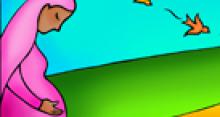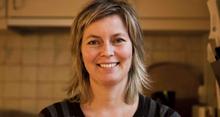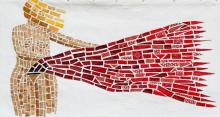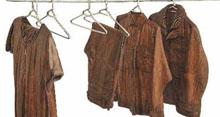Additional Stories
A Labor of Love
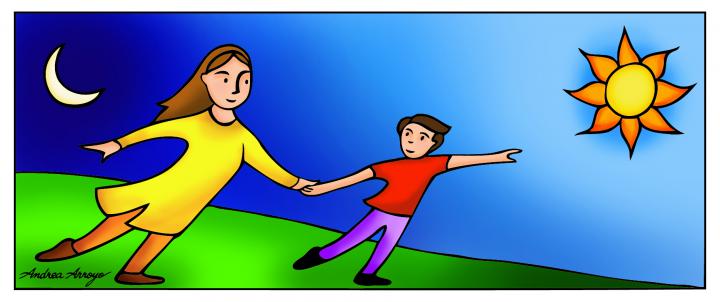
When I was pregnant with my son, I experienced some of the happiest moments of my life--a calmness I hadn’t known before, a complete peace with my surroundings. I knew it was not me. It was my baby’s energy, emitting from him. I felt possessed of an inner knowledge that all was out of my control. Ah, such relief to hand over my life and its greater things -- like love and luck -- to something larger than me.
If I dreaded delivery, it was less the fear of the physical agony than the fear of losing the knowledge of being spiritually tied to the world. My son, he was like the breath within the breath, the life within the life, his great and ancient soul filling my small one with a fullness of happiness I had never experienced before.
How lucky I was, yet how frail this miracle of mine.
For I knew from the start there was something very wrong with my pregnancy. During the early stages, I wondered if the fetus had implanted itself incorrectly. Yet, after months of nagging my OB, when she finally performed an ultrasound, there was nothing wrong. There he was, my son, at four months, no bigger than my thumb, beating inside me, more of a life force than my own.
For the duration of the pregnancy, whenever my fears rose up, I was comforted over and again: the ultrasound, the blood work, the fetal heartbeat, everything was normal. I nagged my OB so many times that during one visit she even hinted that perhaps I was just neurotic.
I told myself the doctor was right. My worries weren’t coming from some inner intuition but from the same old fears every first-time mother must endure. So I pushed myself to go on as before. I continued to take English at a local college through to my final trimester. During my ninth month I hiked to the top of a mountain in the Lakes Basin region of California, 8587 feet. I even finished the first draft of my novel two months earlier than planned.
Then the ninth month came, the countdown began, the car seat was installed. Shortly before my due date, I had a sudden onset of symptoms and the old fear that something was wrong began once more to consume me. On my last visit to the OB, I took my husband along. I was too embarrassed to keep pestering my doctor, especially after she’d hinted that I was being irrational, so I prepped my husband to speak for me: “She’s itching all over, she’s vomiting, she’s not peeing at all--isn’t this unusual for a pregnant woman?”
The doctor laughed it off. She said, “By next week this time, you’ll be home from the hospital with your baby, both of you healthy and happy.”
By the next night, I was in the neuro ICU, the intensive care unit for patients with brain trauma.
I had gone into labor the same night I’d spoken with my OB and delivered my son after twelve hours. During pushing, I complained of severe headaches and chest pain, vision problems. I was ignored again. For my heart pain, I was given Alka-Seltzer.
Twenty minutes after delivery, I had a seizure. And my memory fails. What follows is what I was told by doctors, by my brother, by my husband.
Eight hours after my seizure, I was finally wheeled down for a CT scan of the brain. It showed what the doctors weren’t expecting: two hemorrhages, one in front, one in back. One was a subarachnoid hemorrhage, which my younger brother, a resident in neurosurgery, tells me kills 60 percent of patients. That is, patients who have no other medical condition but the subarachnoid hemorrhage. I had other things going on.
Liver failure. Kidney failure. Heart damage. Pulmonary edema. Single-digit blood platelet count. Blood that had stopped clotting. Such severe brain swelling that it wouldn’t respond to medication, and the doctors were planning to drill a hole in my head to relieve the excess water. Hundreds of strokes, that was what the doctors thought was happening in my swollen brain, a galaxy of popping and shooting blood vessels.
The neurologist told my family that if I was lucky, I would die. If not, my husband would end up being my ward.
I am told I went into a coma. I am also told I was being awakened frequently to prevent me from moving even deeper into a coma. When awake, I am told, I did not recognize anyone, not the doctors who remained vigilantly by my side, not the personal nurse assigned to monitor me twenty-four hours, not my best friend, not my brothers or parents, not my husband.
Tim says the first time I “woke up,” he stood over me and asked how I was feeling and, in response, I said, “Who are you?”
He told me he was my husband, and I told him that the doctor who happened to be in the room was my husband. For the rest of my days in ICU, I apparently held to this notion.
What is it that I remember? I remember Isham, shoving and winding his way out of me, and thinking he had a long body. I remember the shock in finally seeing him, his face so different from what I had imagined. For nine months I had been preparing my white husband for having a brown baby. Yet, here he was, born with skin fairer than even my husband’s, and gray-blue eyes. I remember wanting to hold him, but the doctors had whisked him to a table far from me to be wiped and cleaned, his lungs sucked of any impurities.
Then there is darkness. And two people inhabiting this darkness.
The best way to describe it is by the epidural I’d been given during delivery. I hadn’t wanted it, enjoying each spike of pain that brought me closer to Isham, but the nurses had insisted. When it was finally put in, the doctor had injected it incorrectly so it numbed only half of me. The right half. I had been thrilled, and during delivery had lived and reveled in the left side of my body, the body alive to the pain of emerging life.
Like that, in the darkness where I resided, there were two selves, and only one was “waking up” at the doctors’ insistence to prevent me from diving deeper into a coma. This self, whenever she was awake, thought of Isham, and screamed that he was still inside her, wanting to come out -- couldn’t anyone help her to push? It seems the internal clock must have stopped during delivery. So the one who had her eyes open, shouting for her son, was the one who was asleep.
And the one awake was the one residing in darkness. Darkness. That is what I remember. An enveloping darkness in which there are no relationships, no ties, no love, no fear, no creation, no connections. And, in this way, there is peace.
It is said that at the end of Buddha's life, when he was asked what there was to know about death, he turned over his bowl. Meaning, an emptiness within an emptiness.
I was residing inside that turned-over bowl.
Coming out of it -- the miracle that it was -- was indeed a reincarnation.
But a month after being released from the hospital, I was still sunk in a depression that frightened even me. I kept asking myself why I had suffered so much -- and still was, with right-eye blindness, debilitating headaches, breast milk so full of toxins it had to be pumped and thrown away. I was a writer whose speech had left me. I suffered from severe aphasia. If I wanted, I couldn’t even stand by myself and walk from my bed to the bathroom, let alone take a shower or brush my teeth or sit on the toilet in privacy. Although I was now a mother, I was as helpless as my newborn. How would I raise him when I couldn’t take care of myself?
Then one morning, while I was holding Isham, he reached up and touched my face. His gray-blue eyes stared into mine, as though understanding something about me I didn’t understand myself.
I’m not alive, I realized, not even now that I’ve returned from the hospital. So focused had I become on what I’d lost that I wasn’t seeing the gift that was before me: my son, our future together. I was going to be able to watch him grow up, me, the one who had seen the darkness inside that bowl. Life, it is not simply to be alive, it is to be awake. This is what my son taught me.
The following morning, I gathered the courage to begin my life again. To do so, I had to trust that Allah wouldn’t blindside me a second time and I had to trust that my body wouldn’t betray me once more. It took me two and a half years to recover. In that time, I learned to walk again alongside my son’s first steps. Together, Isham and I each met our milestones: learning to speak, to write, to bathe, to brush our teeth, to laugh.
There is a saying in Islam that encapsulates how I feel as a mother: I am God, and God is me. Yet, God is God, and I am me. That is how deeply connected I feel to my son.
This year, my baby boy turns twelve years old. Each year, on his birthday, we celebrate his birth but also light a candle for my own continued life.
In Sufi Islam, we say a small fire burns in each our bellies, the fire of life that only Allah has the power to extinguish. When I think of Buddha turning over that bowl, I see an image of a full belly, of pregnancy, of creation and connection, the miracle of one love holding us all together.
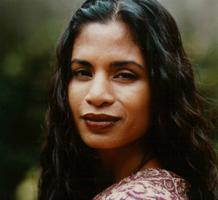
Samina Ali was born in Hyderabad, India and raised both there and in the United States. Her debut novel, Madras on Rainy Days, was awarded the Prix Premier Roman Etranger Award by France and was also chosen as the finalist for the PEN/Hemingway Award in Fiction. Poets & Writers Magazine named Madras as one of the Top 5 Best Debut Novels of the Year. Samina has been named a Muslim Leader of Tomorrow and works actively for Muslim women's issues. She speaks regularly at colleges across the country and has also been traveling internationally with the U.S. State Department.
Illustration by Andrea Arroyo
Related Content
|
Leila Aboulela tells the story of a pregnant woman who recently moved to a new city for her husband's job; she is often alone, and feels uncertain and unmoored as she awaits the birth of her baby. |
Anne is a middle-class mother from Norway – the best country in the world to be a mother, according to the aid agency Save the Children. Nevertheless, her life hasn’t been free from tragedy; she lost one child in labor, despite access to the very best maternal health care. |
As a way to process and release the pain and anger around her traumatic labor and delivery, Renee Hoffman created this Cesarean Quilt. |
Humaira Abid depicts the pain and disappointment that comes along with miscarriage in her intricate wooden sculptures.
|
